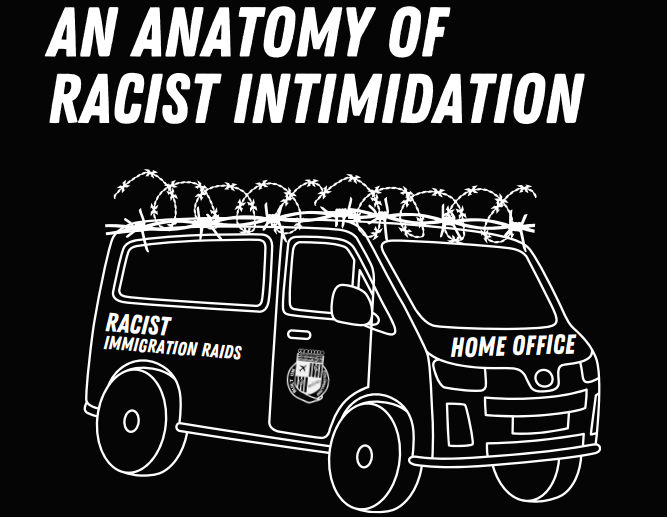The Migrants Rights’ Network has published a brilliant new report entitled Immigration raids: an anatomy of racist intimidation.
An immigration raid is a tactic used by the Home Office to detain migrants in the UK, to make them feel unwelcome, and to spread fear in the surrounding communities. The Home Office has 19 ‘raid squads’ across the country. These squads are officially called Immigration Compliance and Enforcement (ICE) teams. They carry out daily raids, beginning in the early hours of the morning to catch people when they are still sleeping. In recent years, raids on workplaces have been ramped up to crack down on alleged “illegal working”.
What sets the report apart from other work is that it exposes the usually more secretive and hidden aspects of immigration raids, including who plays a part in them behind the scenes, and how they come to be.
The timing of the report’s release could not be more apt: last week, the new government announced a ‘major surge’ in immigration enforcement, which you can read about here.
“For a long time, immigration control has operated as a frontier of enhanced and morphing State power: of sorting and processing, of allocating and denying access to rights, of extraction, of punishment, of confinement and of surveillance. It has operated as a means to enforce and maintain a vastly unequal, racial order. However, this report shows us that as much as raids are used as part of attempts to sever solidarity within and between communities, this is not complete. Because up and down the country, communities are also strongly forging anti-racist solidarities predicated on the bravery and vision to build futures where the forms of order which raids are an extension of are dismantled.”
Key findings
The key findings of the report are as follows:
- Immigration Enforcement raids are a form of racist State kidnapping and an extension of colonial divide and rule tactics
- Between January 2022 and September 2023, 19,895 immigration raids were conducted. While this was fewer than previous pre-COVID years, the nationalities most affected stayed the same and formed a higher proportion of total raids South Asian nationals made up 29% of those targeted by immigration raids. Indian nationals formed the largest group affected by raids at 14%
- Immigration raids tend to happen in city centres, reflecting the greater proportion of raids happening on businesses instead of in homes. In certain cities, like Birmingham and London, however, immigration raids tend to happen in areas where there are the most racialised people The highest number of immigration raids in 2022 and 2023 occurred in Belfast around the harbour (1,277), followed by Stranraer (1,102) and Birkenhead (485), around the docks. These are all areas covered by Operation Gull, the joint border policing exercise between police and immigration services in the UK and Ireland
- The proportion of people arrested as a result of immigration raids has increased in 2023. Since March 2023, more than half of people present at an immigration raid have been arrested
- The proportion of people deported following an immigration raid increased in Spring 2023, from less than 10% to 15-20%
- The value of penalties for working without the required migration documentation increased from an average of £4,600,000 between January 2022 and June 2023 to £8,400,000 between July and December 2023. These fines are disproportionately in the Midlands and East of England
How to resist a raid
The report closes with a section entitled How to resist a raid, which we encourage our community to read.
You can also learn more about immigration raids, your rights and what to do in our Legal Update blog.
















Discussion: